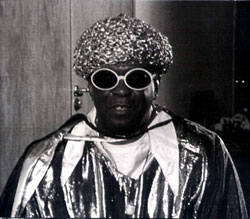
This sprawling three-disc set, comprising two audio CDs of the concert in question and a corresponding DVD interviewing Ra himself, is a veritable wet dream for Sun Ra fans, filling in yet another part of the massive Sonny Blount (aka Sun Ra) and company's oeuvre/puzzle. Certainly completists are going to find this set an absolute must; "outsiders" who might find Ra's brobdingnagian catalogue intimidating are better advised to seek out the many classy reissues on the Evidence label, and, particularly, Ra's less stormy studio recordings. Helsinki 1971 bears some stylistic resemblances to the experimental Nuclear War, at least in its stridency and bombastic impulses, but what is unique about this document is its utterly brazen, cataclysmic approach, especially on disc one's epic, half-hour plus "Discipline 8," which reincarnates Coltrane's most out-there, late period magnum opuses, an explosive outburst of universe-ripping horns and big bang chaos.
But we're getting ahead of ourselves. The aforementioned piece might be the first disc's governing maelstrom, yet it remains just one incredibly visceral performance on an expansive program. The Arkestra works up a bevy of group chestnuts as well, all competently recorded and sonically up to the task; the hall's acoustics, especially during the Arkestra's more controlled moments, lends its own otherworldly ambience to the proceedings. The band in fact does a rather ethnically-infused rendition of "Love in Outer Space" that reinforces the idea that the original studio version was destined for bigger and better things once in view of a live audience; the polyrhythmic interplay between the horn section and the percussion's gamelan-esque hotbed is nothing short of dazzling. Ditto "Watusi", where the full-blown big band histrionics channel the mutant blues of Rahsaan Roland Kirk as much as classic Ellington, all processed through the galvanic Ra's unique filter. Which brings us back to the molten lava of "Discipline 8", surely one of the Arkestra's crowning achievements: turning from outright cacophony to wistful contemplation on a dime, this is the sort of stuff that must have lit inspirational fires under the arses of everyone from Borbetomagus to John Zorn up through the current crop of diffuse, underground noiseniks.
Disc two features much in the way of common Arkestral coin, from "Calling Planet Earth" to "Space is the Place", pieces that Ra and his cohorts kept on evolving over time and on a plethora of subsequent live outings, taking the call-and-response exhortations of the former and augmenting with sliding masses of horns and woodwinds, while eking out new worlds to conquer via the latter. Truth be told, this particular incarnation of "Space is the Place" is one of the better versions to grace the ear, and that's saying something: clearly the band was in top form for this Helsinki date, where swing was indeed the thing, a genre they took to heretofore unknown ports-of-call and dimensions. Then there's a more jaunty piece such as "Second Stop is Jupiter", which juxtaposes quirky vocal harmonies with the Arkestra's low-grade horn sweeps, gutteral chanting, and Ra's singular keys. Breathtaking, to say the least.
And, finally, for the true aficionado, the accompanying DVD reveals the iconoclastic Mr. Blount to be a man of many words yet definitely the mystic as well, a true sonic alchemist who believed in both his mission and his crew. The sense of wonder, the desire to explore, reach out, and embrace so many new aural vocabularies, is, if not implicitly, at least charmingly illustrated by Blount's own idiosyncratic vivacity and singular vision. This was an artist who clearly preferred to let his music speak for itself; journalists and listeners are left to their own devices on how they want to dissect/probe the resultant myth. Perhaps the lack of prurient insight wasn't as forthcoming as his many enthusiasts desired, but then again, even the barest of glimpses into the Sun Ra psyche provides much in the way of reward.
Comments and Feedback:



More Recent Reviews, Articles, and Interviews @ The Squid's Ear...


|

